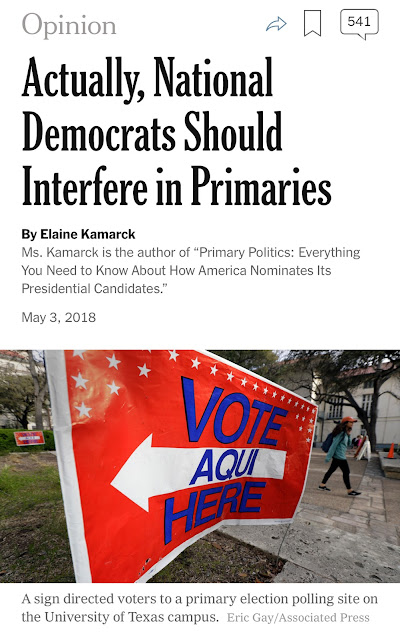(Quick note: I wanted to post this as a blog entry much sooner than on this date. But, other news and/or topics came up. With the week of May 21, 2018 leading to Memorial Day weekend, I figure squeezing this on this posting date is better late[r] than never.)
Elaine Kamarck, a Democratic Party superdelegate who was part of Al Gore’s failed 2000 campaign, and who hails from the Brookings Institution, and who is a corporate Democrat, wrote a piece from a few days ago in The New York Times. “Actually, National Democrats Should Interfere in Primaries” is the title. Link: DCCC Democratic Primaries Interference.
Kamarck—who was interviewed several months ago in a report covered by The Young Turks’s Emma Vigeland—argued in favor of keeping the superdelegates nomination system. And, in this New York Times piece, she argues for the national Democratic Party having its say who gets to win primaries.
I am opposed to Elaine Kamarck and her precious superdelegates. Years ago, I did not consider this because I was not aware. (I did not always follow politics.) But, with over 30 million votes cast for the 2016 Democratic presidential nomination, and 700 or so being superdelegates, what that means is that each individual superdelegate’s weight in vote was worth over 40,000 votes.
The Democratic Party Establishment, delivering from time to time talking points on who every vote should count and that the Electoral College distorts the will of the people (because of Elections 2000 and 2016 delivering split outcomes), are in no right position to argue for abolishing the Electoral College yet keep their superdelegates nomination system. And, come to think, the Republican Party has no such system that is comparable.
The Democratic Party Establishment—and this very much includes Elaine Kamarck—wants to tell voters who they may have as a Democratic nominee. (Elaine Kamarck, and her ilk, want corporate Democrats.) I will not comply. Come to think: Not everyone can get what he wants. While I may not be able to get a truly progressive Democratic Party nominee, at least the Democratic Party will be not be able to receive any of my general-election votes. This was what I did in 2016. And, yes, it is possible for me to vote for the officially named Republican Party. After all, this opens up something in the way of an opportunity.
I have linked the following video from Jamarl Thomas.

No comments:
Post a Comment